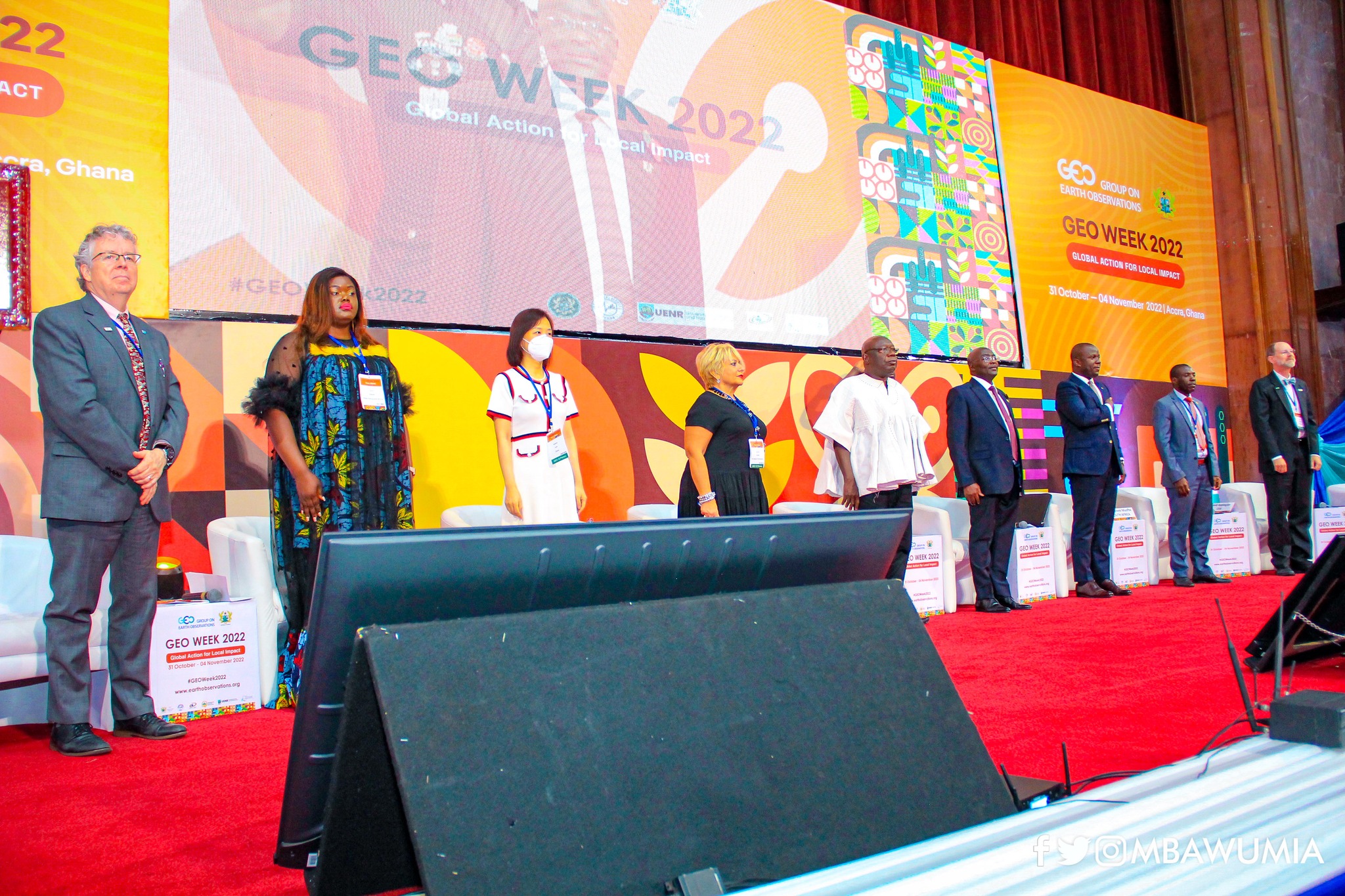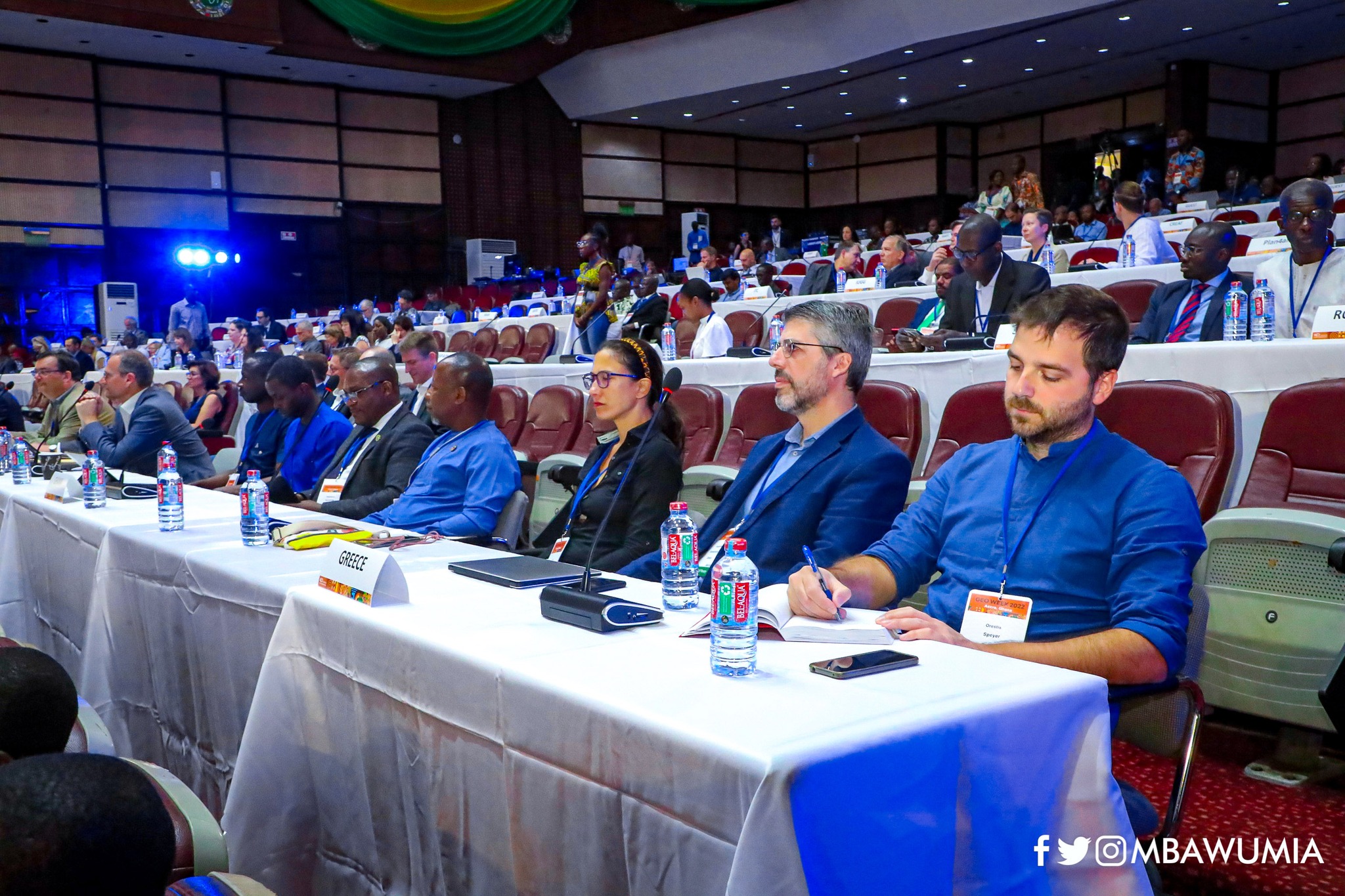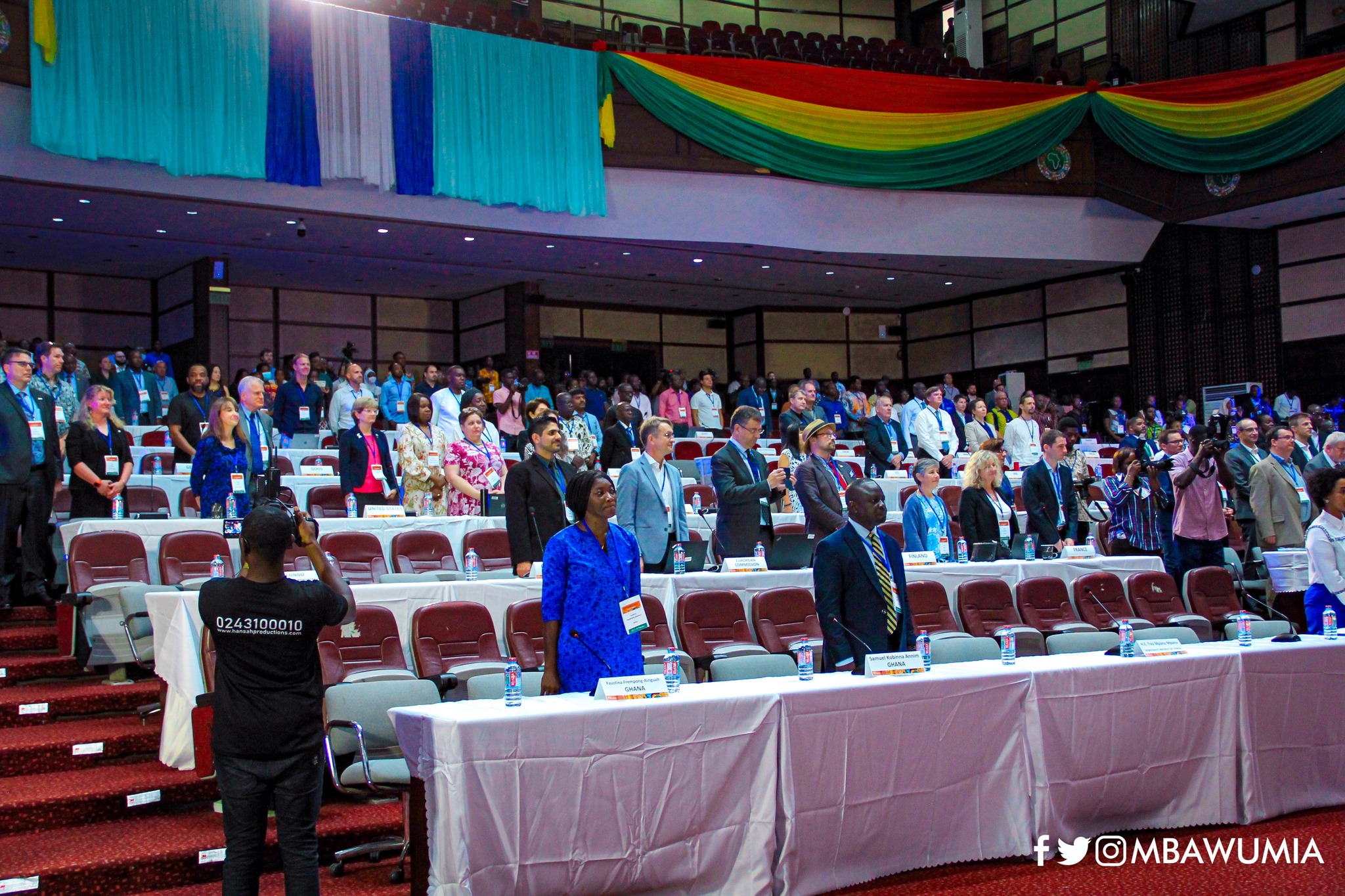- Salutations
- Co-Chairs,
- Ministers,
- Heads of Delegations,
- Delegates,
- Members of the Diplomatic Corps,
- Distinguished Guests,
- Ladies and Gentlemen,
On behalf of the Government and people of Ghana, I welcome you all to the city of Accra. It is my pleasure and honour to be here with you today at the 18th Plenary of the Group of Earth Observations (GEO). Under the title “Global action for local impact” the meeting represents the pinnacle of global collaboration for accelerating the use of Earth observations as evidence for local impact, both in Africa and around the world.
It has been exactly 20 years since the global community highlighted the need for coordinated observations relating to the state of the Earth at the World Summit on Sustainable Development (WSSD) in Johannesburg, South Africa. We now know how data and information received from orbit serve as valuable scientific tools to improve our understanding and management of the Earth and the environment.
Today, investments in Earth observations (EO) capabilities are growing and enabling the widespread application of environmental intelligence to tackle challenges. Despite the increased data availability than ever before, many low- and middle-income countries are lagging in infrastructure, capacity, and expertise to tap into advances made in EO technologies.
The Africa Union’s (AU) Agenda 2063, the continent’s blueprint which is aligned with the post-2030 Agenda, seeks to transform Africa through inclusive and sustainable socio- economic development. Fundamental to Agenda 2063 are the African Outer Space Programme and African Space Policy and Strategy that reinforce the continent’s vision to not only be a consumer in the global space arena but to become a producer and regulator of space products.
Through these initiatives, the AU is working to address the growing needs of African countries to harness space technologies and services, including Earth observations to drive policies and decisions to attain the agenda 2063 and the Sustainable Development Goals (SDGs).
As we organize ourselves as a community today for this GEO Plenary in Ghana and subsequently for the United Nations Climate Change Conference (COP 27) in Egypt, we are reminded of the major environmental, climatic, economic, and social challenges confronting the Earth.
Evidence of melting glaciers, rising carbon emissions, and rapid degradation of the earth’s natural resources keeps getting stronger each year. Recent heatwaves and wildfires in Europe and severe storms and floods unleashed in some parts of Africa, the Americas and Asia have contributed to severe destruction and displaced thousands of people.
These events reinforce our resolve to continue working collaboratively to find innovative solutions to build resilient economies, secure food, and water systems, and ensure the sustainable management of our planet.
Ladies and Gentlemen, this gathering presents a unique opportunity for us to renew our unequivocal commitment to deepen international collaborations and develop national EO capabilities to support socio-economic transformation for the achievement of the “Africa We Want” and the “World We Want”, as articulated in the agenda 2063 and post-2030 Agenda respectively.
Ghana has made significant progress in our poverty reduction effort. Over 2 million citizens no longer live in poverty. Widened access to education, jobs, higher agricultural production, and rapid urbanization drove poverty reduction. Yet, the rapid urban growth puts pressure on our cities, including secondary cities, which have grown comparatively faster than larger ones.
Intra-North-South and rural-urban migrations contribute to urban sprawl and expanding informal settlements. Unplanned spatial expansion of big cities threatens economic efficiency, increasing social and environmental costs for urban commuting. Natural resource depletion heightened by unsustainable mining, inadequate waste management and sanitation, make Ghana extremely vulnerable to climate change and environmental degradation and threaten resilience and economic growth.
Existing efforts to tackle these challenges will require accurate, global, and timely data and information to support sustainable development in the country. Earth observation systems could easily be used to track, and in some instances minimize the negative impact of these environmental problems.
In Ghana, for example, we are applying the products of the Digital Earth Africa program to monitor landscape changes because of illegal mining activities. Developing an interoperable data ecosystem that combines Earth observations data with other data, including socioeconomic data, citizen data, and statistical data, among others would be more meaningful and impactful.
Our development priorities are focused on economic transformation through value-addition to create jobs, reduce poverty, and enhance social inclusion while sustaining the integrity of our environment. Our medium and long-term development plans are underpinned by the “Ghana Beyond Aid” vision to change the mindsets of our citizens towards an increased reliance on internal resources plus private sector investment to lead economic transformation.
The application of digital technologies is fundamental to the achievement of the Ghana Beyond Aid agenda, with emphasis on the maximization of resources, investments in agriculture, improved health, and industrialization, enhancing critical skills and education and promoting renewable energy and energy efficiency.
We are almost finalizing a new Digital Economy Policy and a Digital Transformation Blueprint to position Ghana as the leader in ICT innovation in Sub-Saharan Africa. The ongoing Ghana Digital Acceleration Project is expected to increase access to mobile internet and broadband services by encouraging private sector investment in last-mile connectivity in underserved and rural areas, with particular attention to women, persons with disabilities and the youth.
Ladies and Gentlemen, Ghana’s Presidency of the Vulnerable Twenty Group (V20) is a manifestation of our country’s commitment and priority to joining the rest of the world to address the rapid decline of our planet’s health and its vulnerability.
The fight against poverty, hunger, natural resource depletion and efforts toward a clean environment, and to achieve economic prosperity is at serious risk without a safe and secured planet. We believe that this gathering offers Ghana and the rest of Africa the opportunity to catalyze increased use of Earth observations data, tools, and services to inform decisions for accelerated climate and sustainable development action.
We are working through bilateral and multilateral partnerships to put in place concrete actions to boost resource efficiency, establish a circular economy, mitigate, and adapt to climate change, mitigate disaster risks and halt biodiversity loss. We are also actively pursuing improved ways to harness the power of earth observations to support planning and decision-making in weather forecasting, measuring land-use change (such as deforestation), monitoring coastlines, and monitoring and responding to disasters, including fires, floods, and earthquakes.
On this note, we are happy to inform you that Cabinet has approved the Ghana Space Policy and Implementation Plan that will enable the full operationalization of the Ghana Space Agency next year. We extend an invitation to you all to partner with us as we embark on this exciting journey.
Ghana through our representatives has been active in GEO and its activities. We value the GEO convening power to connect countries, organizations, and experts to collectively address global challenges. We are proud to acknowledge the active engagement of our Lands and Natural Resources Minister on the Governing Board of the Digital Earth Africa Program, a GEO initiative.
Other Ghanaians are playing active roles in several activities such as GEO Land Degradation Neutrality and GEO Blue Planet initiatives. Some EO activities have been implemented to address critical challenges – for example, the application of Digital Earth Africa tools and services to monitor and quantify deforestation and mining activities in Ghana, monitoring of oceans and coastal through the GEO Blue Planet initiatives, and the integration of geospatial data with statistical data to monitor human movement during Covid-19 lockdown.
I acknowledge the success of GEO in convening the Earth observations community, evident from the increasing number of countries and participating organisations. Providing support for access to Earth observations data goes hand in hand with the required technical expertise and infrastructure.
In this regard, I call upon the GEO community to continuously invest in capacity development in low and middle-income countries to acquire the necessary technologies, knowledge and skills to access and use EO data effectively. We see GEO playing a prominent role in fostering cooperation and partnerships among countries to co-design and co-develop programmes and initiatives that support countries with limited EO resources and capacities.
As you gather here to refine the post-2025 strategy for GEO, I call upon you to accelerate Earth observations initiatives, programs, and projects to deliver tangible socioeconomic and environmental impact at the country level. The establishment of national GEOs can be instrumental in promoting institutional coordination for the advancement of EO activities at the country level. Through impactful activities, countries will experience the GEO value addition and be motivated to actively contribute to the growth of the GEO community.
As we prepare to move to the next chapter, we must sustain and build on the gains made by GEO so far. It is imperative that the GEO community continue working together to create the enablers for nations not only to access EO data and services but use them to address identified development challenges. Nations with advanced EO capabilities must provide leadership, financial and technical support to developing nations to bridge the EO gap.
Ghana reaffirms its commitment to being an active member of GEO. I remain hopeful that the outcomes of this meeting will maintain the momentum and reassert the global call to leave no one behind.
I wish you a pleasant stay in the city of Accra and may the Plenary be a resounding success.
Thank you.





